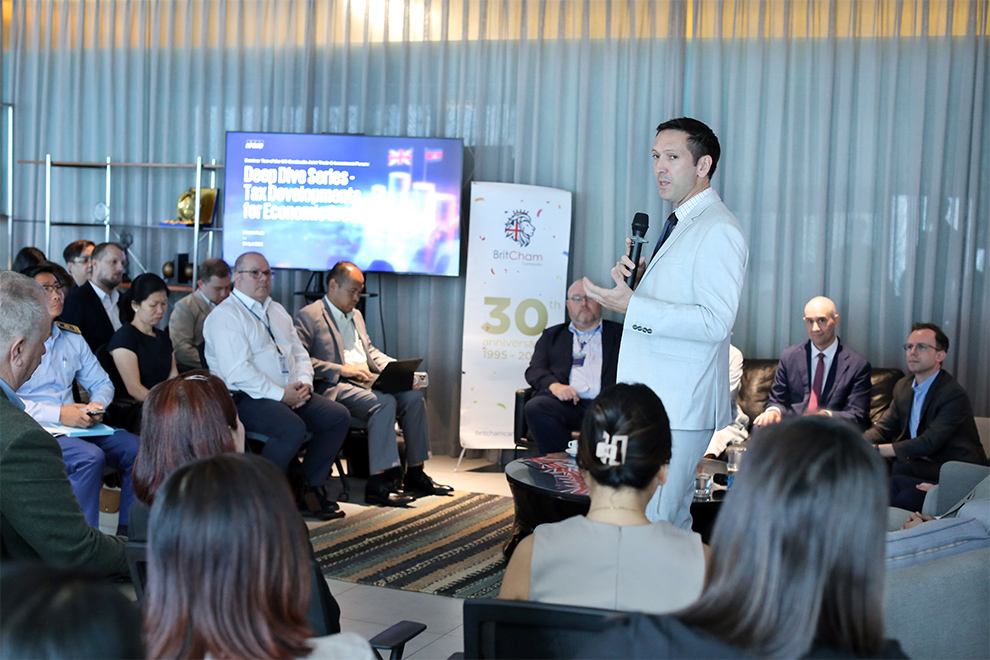
British ambassador Dominic Williams addresses the April 29 UK-Cambodia Joint Trade & Investment Forum. Hong Raksmey
British ambassador to Cambodia Dominic Williams has highlighted the crucial role an effective taxation system will play in supporting Cambodia’s economic growth, particularly as the country looks ahead to its Vision 2050.
He shared his views as he delivered his opening remarks to the April 29 UK-Cambodia Joint Trade & Investment Forum. Hosted by BritCham Cambodia, in collaboration with the British embassy and the UK Department for Business and Trade, the seminar was held at the Phnom Penh offices of KPMG Cambodia.
The event provided a platform for discussions on how taxation can balance government investment needs with the growing demand for a business-friendly environment.
Williams emphasised the centrality of taxes in ensuring governments can fund public goods that benefit society.
“Governments need revenue to take collective action,” he explained.
“Whether it's defence, infrastructure or healthcare, taxes help fund the essential services that all citizens rely on,” he added.
The ambassador acknowledged that while debates about the level of taxation and its uses will vary, taxation remains a fundamental aspect of societal development.
He outlined the characteristics of an ideal tax system – predictability and efficiency – in order for individuals and business owners alike to plan their finances.
“A tax system must be predictable, so businesses can make informed decisions about where to invest,” said Williams.
“It should also be efficient, minimising the administrative burden on taxpayers and ensuring the process is smooth and cost-effective,” he continued.
He then turned his attention to Cambodia’s specific challenges as the country approaches its 2029 graduation from Least Developed Country (LDC) status.
This transition will require the Kingdom to rely less on international aid and more on domestic resources.
“As Cambodia moves forward, it will need a diverse set of tools to fund its development. Increasing government revenues through taxes is a critical part of that toolkit,” noted Williams.
He also acknowledged Cambodia’s need to maintain a favourable environment for foreign investment.
Williams noted that investors are highly sensitive to tax rates and the predictability of the tax system. If they don’t have certainty about costs, it could deter them from investing.
He concluded by stressing that while there is no one-size-fits-all solution, the UK is committed to supporting Cambodia’s efforts in optimising its tax system.
“We’re already providing technical assistance through our Revenue and Customs Department, and we’re keen to bring our commercial expertise to the table,” Williams said.
“Our goal is to help Cambodia continue its remarkable growth trajectory,” he added.
The discussion came at a pivotal time as Cambodia is focused on attracting more foreign investment to foster private sector-driven growth.
With the private sector playing a major role in the Kingdom’s economic development, finding the right balance between taxation and investment incentives is key to ensuring the country’s continued progress.
The forum was part of an ongoing series designed to enhance the UK-Cambodia trade and investment relationship.
According to an April 7 factsheet by the British embassy and the Department for Business and Trade, the combined trade in goods and services between the UK and Cambodia totalled £682 million ($913 million) for the four quarters ending Q3 2024, representing a 14.6% decline compared to the previous year.
UK exports to Cambodia saw a significant drop, falling by 48% to £65 million ($87 million), while UK imports from Cambodia fell by 8.5%, totaling £617 million ($826 million).
Williams highlighted the importance of fostering stronger business ties, noting that despite these challenges, Cambodia’s economic potential remains high.
“Cambodia’s Vision 2050 is a bold, ambitious blueprint for the future,” he said. “But to achieve these goals, Cambodia will need to carefully manage its resources, including how it structures its tax system to fuel growth while maintaining investor confidence.”
The British embassy’s role, Williams stressed, will be to assist Cambodia as it navigates this complex transition.
By offering both technical and commercial expertise, the UK aims to be a partner in Cambodia’s quest for sustainable, inclusive growth.











